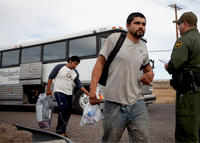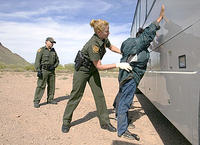-
Arizona waits for court decision before changing immigration law
In response to the 28 July decision by U.S. District Judge Susan Bolton to block the more important provisions of the controversial Arizona immigration law, Governor Jan Brewer suggested that Arizona may “tweak” the law in order to address Bolton’s objections; Arizona legislatures say there is no point in rewriting the law while the state is appealing the judge’s decision; in any event, since Bolton blocked the provisions on grounds that they are preempted by federal authority over immigration matters, then the preemption issue will have to be settled by the courts before the legislature revisits the law
-
-
Drug war fought with American weapons for the American market
Mexico’s drug war is fought with American weapons for the American market; of the 75,000 guns seized, 80 percent came from the United States; they are used to fight over an estimated $40 billion drug business — virtually all for the United States; last Year, at least 2,600 were killed in Mexico’s drug war, and the country is on track to top 3,000 this year
-
-
New baggage screening system from Morpho Detection evaluated

Unlike most baggage-screening systems that create two-dimensional images of objects inside luggage, the CTX 9800 DSi scanners from Morpho Detection create three-dimensional images that can be digitally manipulated by personnel when a bag is deemed to be suspicious; the machines also use advanced software to detect suspicious items; Mineta San Jose International Airport once used 28 machines to process 1,800 bags an hour, but the new system will be able to process the same number of bags using eight machines and require fewer employees to supervise the process; the technology reduces reliance on human observation and interaction with the bags; for the majority of bags, employee contact is only required when a piece of luggage is placed on or taken off the conveyor belt
-
-
DHS seeking unattended sensors technology for border surveillance
DHS is seeking information from companies who can build unattended ground sensors that can detect and locate people, boats, or vehicles moving along rivers, roads, and paths in dense forests; DHS says it needs this capability for border surveillance to monitor those entering the United States illegally in rough terrain
-
-
All U.S. counties on Mexican border now share inmate fingerprints with feds
All 25 U.S. counties along the Mexican border are now enrolled in the Secure Communities project; federal immigration officials now have access to the prints of every inmate booked into jail in these counties; Secure Communities makes the notification automatic; Immigration and Customs Enforcement (ICE), which plans to implement the program nationwide by 2013, says the program has identified more than 262,900 illegal immigrants in jails and prisons who have been charged with or convicted of criminal offenses, including more than 39,000 charged with or convicted of violent offenses or major drug crimes; ICE expects to remove 400,000 illegal immigrants this year; of the 200,000 illegal immigrants deported in the first ten months of fiscal year 2010, 142,000 illegal immigrants were with criminal records and about 50,000 were noncriminals; immigrant advocates say that some counties use Secure Communities to deport noncriminals: the national average of noncriminals flagged by Secure Communities is about 28 percent, but in Travis County, Texas, 82 percent of those removed through Secure Communities were noncriminals
-
-
NY Naval Militia in WMD detection homeland security exercise on Hudson River
Several New York States government agencies take part in an exercise on the Hudson River aimed to examine radiation detection capabilities; the exercise was part of Trojan Horse 2010 an annual maritime security training exercise sponsored by State University of New York Maritime College
-
-
Fingerprint sharing through Secure Communities led to deportation of 47,000

As of 3 August, 3, 494 U.S. counties and local and state agencies in 27 states were using the Secure Communities program to share fingerprints from jail bookings; from October 2008 through June 2010, 46,929 people identified through Secure Communities were removed from the U.S.; of those, 12,293 were considered non-criminals; one immigration advocate says: “ICE has pulled a bait and switch, with local law enforcement spending more time and resources facilitating the deportations of bus boys and gardeners than murderers and rapists and at considerable cost to local community policing strategies, making us all less safe”
-
-
SB 1070 boycotts cost Arizona millions in cancelled meetings

Strong feelings about Arizona’s tough immigration laws are costing the state millions according to resort and hotel operators; the state has lost about 40 conventions and $15 million so far. Arizona hotel association chief executive says that is “a lowball guess”
-
-
FBI agent says Mexican drug cartels more violent than al Qaeda
An FBI Web page quoted an agent calling Mexico’s drug cartels more violent than al Qaeda; the quote, from an unidentified senior agent based in El Paso, Texas, says, “We think al Qaeda is bad, but they’ve got nothing on the cartels”; the FBI says the quote was taken out of context
-
-
Mexican drug cartel offers $1 million for Sheriff Arpaio's head
Maricopa County Sheriff Joe Arpaio is well-known for creating a tent city jail in the Arizona desert, providing pink underwear for inmates, and bragging that he spends more to feed his dog than a prisoner in his jail; on 29 July, the day parts of Arizona’s immigration law, SB 1070, went into effect, Arpaio was in the news for another reason: there was a price put on his head
-
-
Border security funding boosted by $600 million, paid for by increasing H-1B fees
The Senate, by unanimous consent, passed a bill last night which increases border security funding by $600 million; the bill includes $300 million for 1,500 additional Border Patrol agents, Custom and Border Protection officers, and Immigration and Customs Enforcement personnel; $196 million for Justice Department programs; $32 million for two more drones; and other money for things like communications equipment and new facilities; the measure will be paid for by increasing fees for H1-B visas
-
-
Ending "birthright citizenship"
Proponents of ending Birthright Citizenship through repeal of the Fourteenth Amendment often argue that the parents of children born to “aliens” — both undocumented and those present in the United States lawfully —are not “subject to the jurisdiction” of the United States and, therefore, their children born in the United States are not U.S. citizens — but if they were not under the jurisdiction of the United States, “illegal aliens” would not be “illegal.”
-
-
Senate may yet add funds to border security before going on recess

The Senate may yet vote for additional funds for border security before leaving for a month-long recess; Senator Schumer is going to try to push through a bill that provides an additional $600 million for the border; this includes $176 million to hire 1,500 more officers to form a strike force to be deployed in critical areas along the border; Schumer would pay for his measure by raising fees on visas for temporary skilled workers sent to the United States by Indian companies; Republicans, who propose a similar measure, prefer to pay for additional border security by taking unused money from the Obama administration’s economic stimulus program, an idea unacceptable to Democrats
-
-
U.S. mulls legalizing classes of undocumented aliens in absence of immigration reform
An internal U.S. Citizen and Immigration Services (USCIS) memo, titled “Administrative Alternatives to Comprehensive Immigration Reform,” indicates that high level officials within the Obama administration may be considering ways to legalize classes of undocumented immigrants in case Congress does not deal with formal legalization for the estimated 10.8 million immigrants without papers
-
-
Secure Communities to have greater impact than Arizona immigration law
Since 27 October 2008 through the end of May 2010, almost 2.6 million people have been screened with Secure Communities; of those, almost 35,000 were identified as illegal immigrants previously arrested or convicted for the most serious crimes, including murder and rape; more than 205,000 who were identified as illegal immigrants had arrest records for less serious crimes; during an eight-month period between 1 October 2009 to 7 June 2010, ICE figures show that 113,453 foreign nations with criminal records had been deported
-
- All
- Regional
- Water
- Biometrics
- Borders/Immig
- Business
- Cybersecurity
- Detection
- Disasters
- Government
- Infrastructure
- International
- Public health
- Public Safety
- Communication interoperabillity
- Emergency services
- Emergency medical services
- Fire
- First response
- IEDs
- Law Enforcement
- Law Enforcement Technology
- Military technology
- Nonlethal weapons
- Nuclear weapons
- Personal protection equipment
- Police
- Notification /alert systems
- Situational awareness
- Weapons systems
- Sci-Tech
- Sector Reports
- Surveillance
- Transportation
Advertising & Marketing: advertise@newswirepubs.com
Editorial: editor@newswirepubs.com
General: info@newswirepubs.com
2010-2011 © News Wire Publications, LLC News Wire Publications, LLC
220 Old Country Road | Suite 200 | Mineola | New York | 11501
Permissions and Policies
Editorial: editor@newswirepubs.com
General: info@newswirepubs.com
2010-2011 © News Wire Publications, LLC News Wire Publications, LLC
220 Old Country Road | Suite 200 | Mineola | New York | 11501
Permissions and Policies
